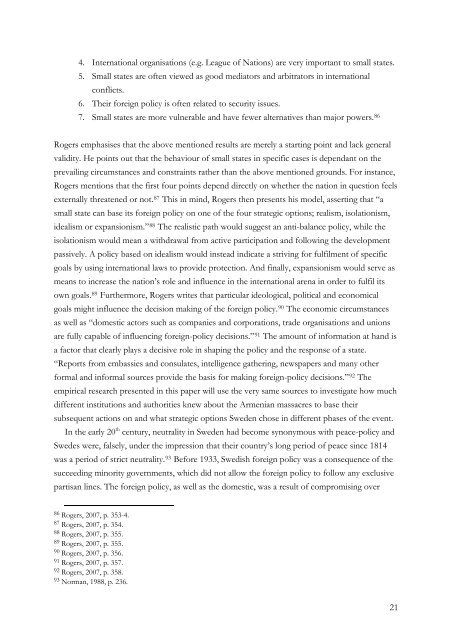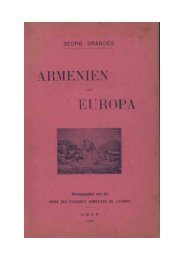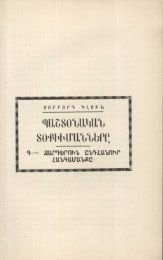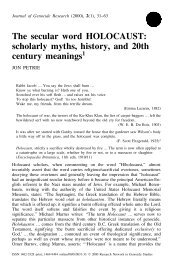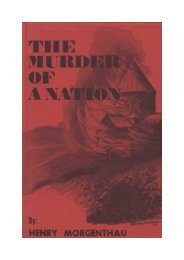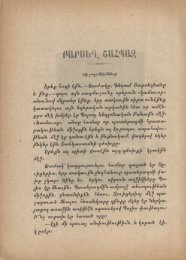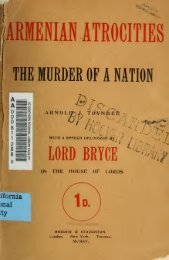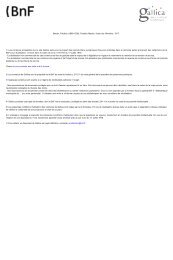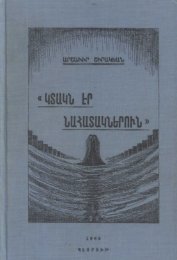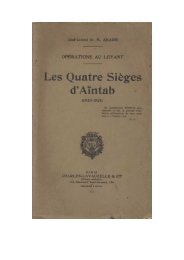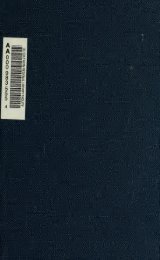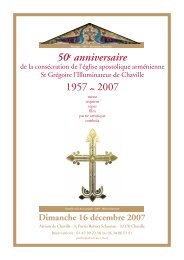Morgenthau and Th<strong>om</strong>pson assert that the shift towards the democratic elected governments,answering to the general public, which replaced those consisting of aristocrats, often answering toone single monarch, also moved to destroy the international morality. According to Morgenthauand Th<strong>om</strong>pson, the rules of morality require the involvement of the individual conscience,persons who can be held responsible for their actions. But when the power of government isdistributed among a large group of individuals with a wide range of perceptions (or no perceptionat all) about wrong and right in international relations, the focus will instead be concentrated onnational interests. The American legal scholar and educator Dean Roscoe Pound confirmed thisin 1923 by saying: “It might be maintained plausibly, that a moral…order among states, wasnearer attainment in the middle of the eighteenth century than it is today.” 82 Andrew Hurrellconcurs to this view:John Rowl’s famous claim that ‘Justice is the first virtue of social institutions’ has, when applied tointernational relations, faced the perennial realist rejoinder that international life has never hadvery much to do with the pursuit of virtue or justice. As Gilpin puts it, ‘Anarchy is the rule, order,justice, and morality are the exceptions.’ 83Furthermore, Morgenthau and Th<strong>om</strong>pson claim that the independence of small states have beensustained due to either the balance of power, the protection of a larger power or simply due totheir unattractiveness for imperialistic schemes. 84Institutions such as neutrality do not only constrain the boundaries of how states can behave,but also empower them to “expand their authority and control over even such powerful actors asthe mercantile c<strong>om</strong>panies.” 85The above presented theory, as mentioned earlier, is modelled mainly in accordance to majorpowers and the constraints applying to them. Small states, however, deviate in their behaviourdue to the fact that they have to adopt their foreign policy making in accordance to a set of ruleswhich differ fr<strong>om</strong> those for larger and stronger states. To model a new basis for the foreignpolicy making of the small states, Rogers uses, among others, the research done by Bo Huldt, inwhich the result is summarised in seven categories:1. Small states tend to behave in an anti-balance manner, often siding with the side whichis seen as the stronger or the winning side.2. Their foreign policy is often short-termed and local in contrast to the global and longtermpolicy of the major powers.3. Small states adopt a legalistic-moralistic attitude towards international affairs, sincethey cannot afford to behave immorally.82 Morgenthau and Th<strong>om</strong>pson, 1985, p. 264-266.83 Hurrell, 2003, p. 24.84 Morgenthau and Th<strong>om</strong>pson, 1985, p. 196.85 Mansbach and Wilmer, 2001, p. 60.20
4. International organisations (e.g. League of Nations) are very important to small states.5. Small states are often viewed as good mediators and arbitrators in internationalconflicts.6. Their foreign policy is often related to security issues.7. Small states are more vulnerable and have fewer alternatives than major powers. 86Rogers emphasises that the above mentioned results are merely a starting point and lack generalvalidity. He points out that the behaviour of small states in specific cases is dependant on theprevailing circumstances and constraints rather than the above mentioned grounds. For instance,Rogers mentions that the first four points depend directly on whether the nation in question feelsexternally threatened or not. 87 This in <strong>min</strong>d, Rogers then presents his model, asserting that “asmall state can base its foreign policy on one of the four strategic options; realism, isolationism,idealism or expansionism.” 88 The realistic path would suggest an anti-balance policy, while theisolationism would mean a withdrawal fr<strong>om</strong> active participation and following the developmentpassively. A policy based on idealism would instead indicate a striving for fulfilment of specificgoals by using international laws to provide protection. And finally, expansionism would serve asmeans to increase the nation’s role and influence in the international arena in order to fulfil itsown goals. 89 Furthermore, Rogers writes that particular ideological, political and econ<strong>om</strong>icalgoals might influence the decision making of the foreign policy. 90 The econ<strong>om</strong>ic circumstancesas well as “d<strong>om</strong>estic actors such as c<strong>om</strong>panies and corporations, trade organisations and unionsare fully capable of influencing foreign-policy decisions.” 91 The amount of information at hand isa factor that clearly plays a decisive role in shaping the policy and the response of a state.“Reports fr<strong>om</strong> embassies and consulates, intelligence gathering, newspapers and many otherformal and informal sources provide the basis for making foreign-policy decisions.” 92 Theempirical research presented in this paper will use the very same sources to investigate how muchdifferent institutions and authorities knew about the Armenian massacres to base theirsubsequent actions on and what strategic options Sweden chose in different phases of the event.In the early 20 th century, neutrality in Sweden had bec<strong>om</strong>e synonymous with peace-policy andSwedes were, falsely, under the impression that their country’s long period of peace since 1814was a period of strict neutrality. 93 Before 1933, Swedish foreign policy was a consequence of thesucceeding <strong>min</strong>ority governments, which did not allow the foreign policy to follow any exclusivepartisan lines. The foreign policy, as well as the d<strong>om</strong>estic, was a result of c<strong>om</strong>pr<strong>om</strong>ising over86 Rogers, 2007, p. 353-4.87 Rogers, 2007, p. 354.88 Rogers, 2007, p. 355.89 Rogers, 2007, p. 355.90 Rogers, 2007, p. 356.91 Rogers, 2007, p. 357.92 Rogers, 2007, p. 358.93 Norman, 1988, p. 236.21
- Page 3 and 4: 1 Introduction.....................
- Page 5 and 6: War, rather confirm the version of
- Page 7 and 8: 1.2 Previous ResearchWhen discussin
- Page 9 and 10: Military Attaché and the missionar
- Page 11 and 12: situation: “It is a crime when Te
- Page 13 and 14: in the following investigation, whi
- Page 15 and 16: killed. The slaughterer slaughtered
- Page 17 and 18: interests. Despite his famous “14
- Page 19: morality, balance of power, or the
- Page 23 and 24: warring parties. 104 This observati
- Page 25 and 26: Concerning the protocols of the Swe
- Page 27 and 28: present in Turkey. These documents
- Page 29 and 30: He also mentions meeting an Armenia
- Page 31 and 32: the annihilation. General von Losso
- Page 33 and 34: 1.5 BackgroundIn order to understan
- Page 35 and 36: 1914, when two inspector-generals f
- Page 37 and 38: to Islam or were sold as slaves to
- Page 39 and 40: 2 Empirical AnalysisThe empirical r
- Page 41 and 42: It does not seem to be the Turkish
- Page 43 and 44: The Turks claim that, at the Russia
- Page 45 and 46: The Armenian population has equippe
- Page 47 and 48: 1917 was the revival year for the A
- Page 49 and 50: Even if the communication between t
- Page 51 and 52: implemented against the Armenian na
- Page 53 and 54: Anckarsvärd continued claiming tha
- Page 55 and 56: Germany is blamed for its accessory
- Page 57 and 58: Here Wirsén took the liberty to co
- Page 59 and 60: On February 19, news of new Armenia
- Page 61 and 62: estricted to the fields of intrigue
- Page 63 and 64: generous offer of President Wilson
- Page 65 and 66: Lange gave a detailed description o
- Page 67 and 68: skin was totally scorched. Another
- Page 69 and 70: which her recurrently emphasised th
- Page 71 and 72:
The sooner calls referring to the A
- Page 73 and 74:
Despite these facts, Armenia was th
- Page 75 and 76:
Svenska Riksarkivet [Swedish Nation
- Page 77 and 78:
Bakhtiari, Kalla det vad fan du vil
- Page 79 and 80:
Chan, Steve and Drury, Cooper A., S
- Page 81 and 82:
Moranian, Suzanne Elizabeth, Bearin


